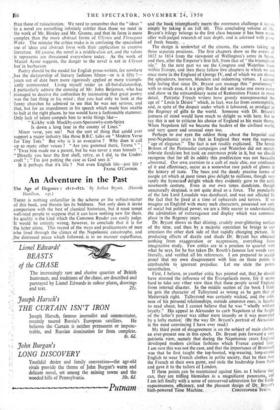An Adventure in the Past 'THERE is nothing unfamiliar in
the scheme pr the subject-matter of this book, and therein lies its boldness. Not only does it invite comparison with the best of classical historians, but it must tempt well-read people to suppose that it can have nothing new for them. -Its quality is the kind which the Common Reader can easily judge. ; It would be entirely wrong, however, to conclude that it is for the latter alone. This record of The ways and predicaments of men ho lived through the climax of the Napoleonic catastrophe, and .:.the distressed peace which followed; is in no manner superfluous, and the hook'triumphantly meets the enormous challenge it incurs simply by taking it on full tilt. This concluding volume of Dr. Bryant's trilogy belongs to the first class because it has been made after well-judged research of rare depth, and is adorned with prose of fresh beauty. The design is sortlewhat of the .cinema, the camera taking up three separate positions. The first chapters show us the events of 1812 to 1814 from the viewpoint of Wellington's army in Spain, and then, after the Emperor's first fall, from that of "the triumphant isle." In the next part we see the Congress and Waterloo from within Europe, and then there follow five chapters in which we are once more in the England of George IV, and of which we are shown the splendours, horrors, blunders and redeeming virtues. I cannot help feeling that since Dr. Bryant can manage this " positioning " with so much ease, it is a pity that he did not make one more move and show us the extraordinary scene of Restoration France in more detail. Patriotic French writers have grossly misrepresented the age of "Louis le Ddsire " which, in fact, was far from contemptible, and, in spite of the despair under which it laboured, as prodigal as the Regency of gifts to the world. Someone with Dr. Bryant's justness of mind would have much to delight us with here, but to say this is not to triticise his choice of England as his main theme. When Napoleon fell we became the leaders of the civilised world, and very queer and unusual ones too. . Perhaps to Our eyes the oddest thing about the Imperial and post-Napoleonic years is that in England they were the supreme "age of elegance.' The fact is not readily explained. The heroic Britons of the Peninsular campaigns and Waterloo did not merely tolerate dandyism but took an enormous pride in it, but we should recognise that for all its oddity this predilection was not basically abnormal. Our own aversion to a cult of male chic, our confusion of it and effeminacy, occur as a somewhat rare patch of gloom in the history of taste. The beau and the dandy practise forms of simple art which at post times give delight to millions, though very rarely the hystericar delight which they evidently gave .ta the early nineteenth centiniy. Even in our own times dandyism, though unnaturally despised, is not quite dead as a force. The popularity of the late Lord Lonsdale was dandiacal, and was not affected by the fact that he jived at a time of upheavals and terrors. If we imagine an England with many such characters, possessed not only of social but political power, we are a little nearer to understanding the admiration of extravagance and display which was common. place in the Regency years.
Dr. Bryant shows us that shining, crudely over-glittering surface of the time, and then by a majestic operation he brings to 'our attention the other dark side of that rapidly changing picture. In producing effects 'of dazzle and shade Dr. Bryant has obtained nothing from exaggeration or suppression, everything from imaginative study: Few critics are in a position to quarrel With what he says, for he has taken Dr. Routh's famous last words very literally, and verified all his references. I am prepared to accept proof that my own disagreement with him on three points is attributable to ignorant prejudice. Let me State the points nevertheless.
First, I believe, as another critic has pointed out, thatijie should have stressed the influence of the nrangelicals more, for' it seems hard to take any cther view than that these people saved England from internal disaster. In the middle section of the book I think he gets the character of Talleyrand as wrong as he gets that of Metternich right. Talleyrand was certainly wicked, and, the cold- ness of his personal' relationships, outside amorouS onesJs hateful to read about, but I cannot believe that he was "wholly without loyalty." His appeal to Alexander to curb Napoleon at the height of the latter's'. power Was either Mere insanity or if was prompted by a lofty motive. (By the way Dr. Bryant's portrait of Alexander is the most convincing I have ever read.) My third point of disagreement is on the subject of male clothes, an ever-present one in this epoch. .Dr. Bryant puts forward a very patriotic view, namely that during the Napoleonic years England developed modern civilian fashions which France copied later. I am sure this was not the case, and that the importance of Brummell was- that he first taught the top-booted, wig-wearing, long-coated English to wear French clothes in polite society, that he then beat the French at their own game, and stole the leadership from Paris and gave it to the tailors of London. If these points can be maintained against him, as I believe they can, they are trifling blemishes in a magnificent panorama,. and I am left finally with a sense of unreserved admiration for the finish, capaciousness, efficiency, and the pleasant design of Dr. Bryant's














































































 Previous page
Previous page